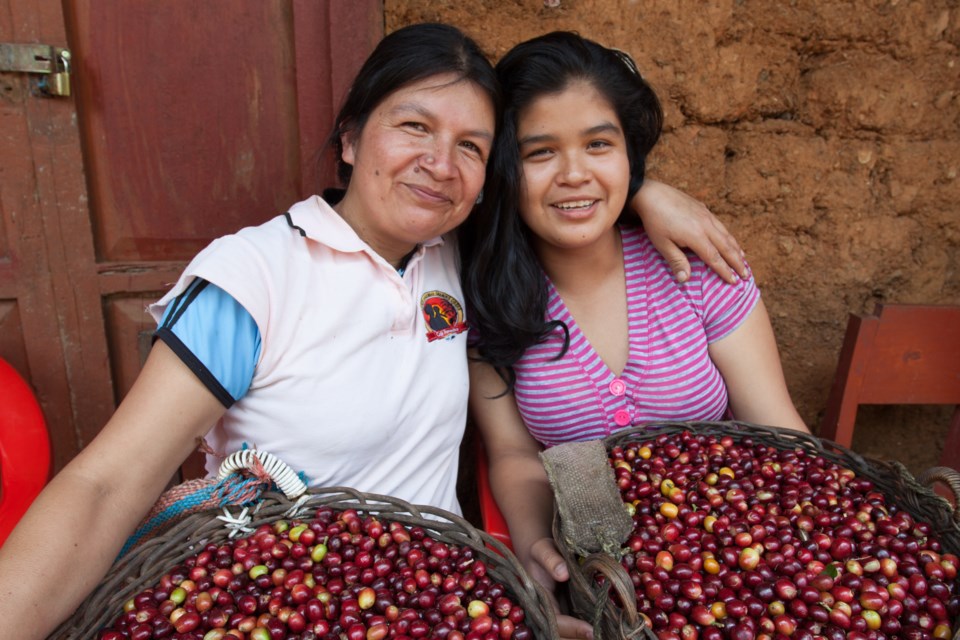Many people can’t start their day until they’ve had their first cup of coffee. It is an international eye-opener, and a growing number of coffee lovers are demanding their morning cup also be ethically sourced.
“I think there are still a lot of people who don’t realize that mainstream coffee does a lot of damage to the environment, the workers and so on,” said Lisa Schincariol McMurtry, community liaison for Sister’s Story Coffee. “It’s important to let people know that because coffee is such a popular thing.”
All too often it is women who suffer most from economic inequality, domestic abuse and poor working conditions on large coffee plantations in the global south, but that story is being rewritten by a cooperative of Indigenous women coffee farmers in northern Peru who are using their new brand, Sister’s Story Coffee, to improve their lives and the lives of women across Canada.
“We’ve had a relationship with these Peruvian women since 2004,” said Bill Barret, founder of Planet Bean. “They have been selling the coffee under their name, which is Café Femenino. So, locally, people know about Café Femenino. But what we want to do is make it national and in order to do that, we had to make a new brand.”
The launching of the Sister’s Story Coffee brand is the first initiative of its kind in Canada to use organic and fairtrade-certified coffee beans, grown by Indigenous women in the Andes of northern Peru and roasted in Guelph, to support women’s shelters and sexual assault centres across the country.
“It’s an innovative way of raising funds for the violence against women sector across Canada through a very ethical fundraising model that really builds a connection with women in the global north and south,” said McMurtry. “So, we are making that connection between local and global investment. Those are things I am excited about with this project.”
By marketing Sister’s Story Coffee exclusively online it allows parent company, Sumac Community Worker Cooperative, to donate 15 per cent of every purchase to a women’s organization of the buyer’s choice.
“If you live in Guelph and you buy the coffee online you can direct your donation to Women In Crisis,” said Barret. “Sly Castaldi has been very helpful in terms of working with us to make the connections across the country with women’s organizations. She was very supportive and behind the product.”
Sly Castaldi is executive director of Guelph-Wellington Women in Crisis, one of 47 women’s organizations across the country that Sister’s Story Coffee is supporting.
“It’s a fabulous idea,” said Castaldi. “Lisa has been in charge of that, but I was happy to put her in touch with the rest of the shelter executive directors and stuff like that and some provincial and national organizations.”
Barret stresses that the success of the initiative is dependent on keeping all sales of Sister’s Story Coffee online through sisters-story-coffee.myshopify.com.
“People are not going to be able to walk into Planet Bean and buy Sister’s Story,” said Barret. “You can only buy it online and the reason for that is we had to create a business model where we could actually provide a significant amount of a donation to the organizations.”
Online sales allow them to broaden their market without increasing retail costs.
“We are trying to grow this nationally and we are working with organizations right across the country from coast to coast,” said Barret. “We want people in Toronto to buy it. We want people in Vancouver to buy it and they don’t know anything about Planet Bean, right, but it is all owned by the mother ship which is the worker co-op.”
The relationship between the Peruvian women farmers' cooperative and the Sumac Community Worker Cooperative is an example of what Barret and McMurtry call “praxis” or social activism put into action.
“It does give your dollar a lot of power, a lot of impact,” said McMurtry. “A lot of positive influence.”
It is the type of positive influence Barret was hoping for when he started Planet Bean back in 1998.
“That has been the Planet Bean business model all along,” said Barret. “It’s not about accumulating stuff. It’s about distributing stuff. It’s about sharing. These women are involved in co-ops and their culture is very much about sharing. So, it doesn’t surprise me that they would say hey, you guys need to help women in your communities because that is sharing. That is just a part of the way they look at the world. You need to share with your communities and that is what we are doing.”



